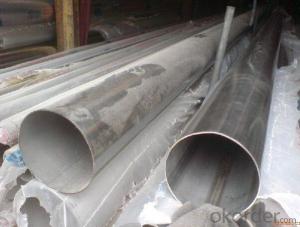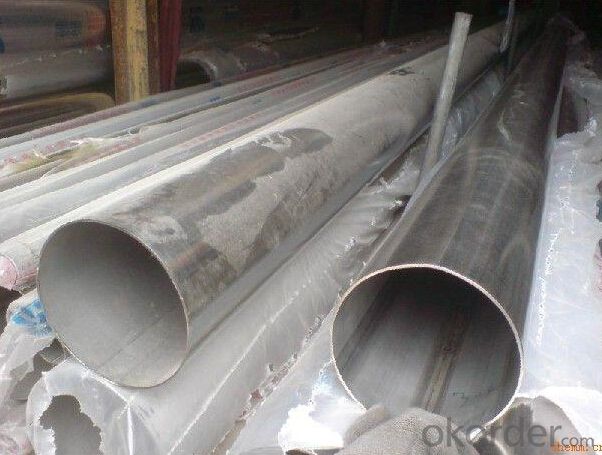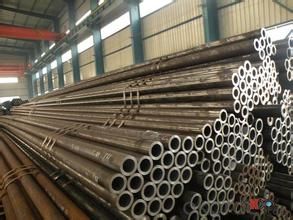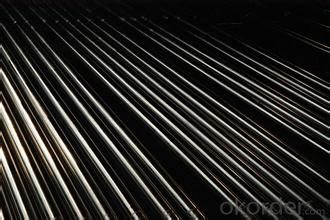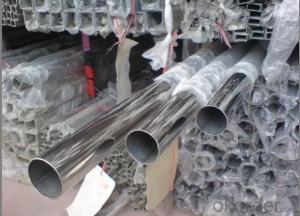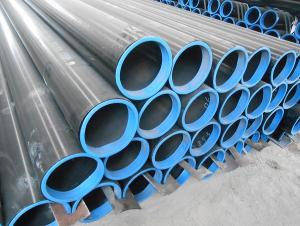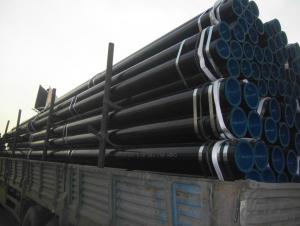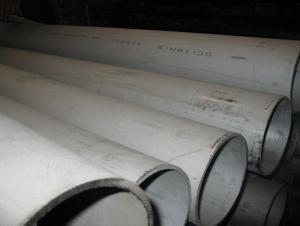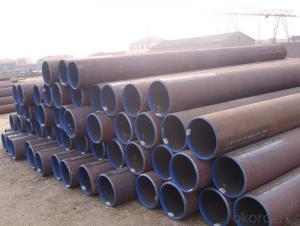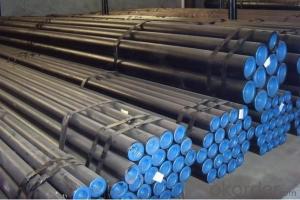Welded Stainless Seamless Hot Rolled Steel Pipe
- Loading Port:
- China main port
- Payment Terms:
- TT or LC
- Min Order Qty:
- 100 kg
- Supply Capability:
- 10000 kg/month
OKorder Service Pledge
OKorder Financial Service
You Might Also Like
1、Structure of Seamless Pipe :
Seamless pipe is formed by drawing a solid billet over a piercing rod to create the hollow shell. Since the manufacturing process doesn't include welding, seamless pipes are stronger and more reliable. Historically seamless pipe was regarded as withstanding pressure better than other types, and was often more easily available than welded pipe.
2、Main Features of the Seamless Pipe :
• High manufacturing accuracy
• High strength
• Small inertia resistance
• Strong heat dissipation ability
• Good visual effect
• Reasonable price
3、Seamless Pipe Specification:
1) Material:20#(ASTM A 106/A53 GRB.API5LGRB,GB),45#,16Mn,10#.
2) Specification range:OD:21.3-610mm,WT:6-70mm,length:6-12m or according to the requirement of clients.
3) Excutive standards:GB,ASME API5L.ASTM A 106/A53,Despite of the above standards,we can also supply seamless steel pipe with standard of DIN,JIS,and so on,and also develop new products according to the requirements of our clients!
4) Surface:black lacquered,varnish coating or galvanized.
5) Ends:Beveled or square cut,plastic capped,painted.
6) Packing:bundles wrapped with strong steel strip,seaworthy packing.
4、Packaging & Delivery
Packaging Details: | seaworthy package,bundles wrapped with strong steel strip |
Delivery Detail: | 15-30days after received 30%TT |
5、FAQ of Seamless Pipe :
①How is the quality of your products?
Our products are manufactured strictly according to national and internaional standard, and we take a test on every pipe before delivered out. If you want see our quality certifications and all kinds of testing report, please just ask us for it.
Guaranteed: If products’ quality don’t accord to discription as we give or the promise before you place order, we promise 100% refund.
②How about price?
Yes, we are factory and be able to give you lowest price below market one, and we have a policy that “ for saving time and absolutely honest business attitude, we quote as lowest as possible for any customer, and discount can be given according to quantity”,if you like bargain and factory price is not low enough as you think, just don’t waste your time.Please trust the quotation we would give you, it is professional one.
③Why should you chose us?
Chose happens because of quality, then price, We can give you both.Additionally, we can also offer professional products inquiry, products knowledge train(for agents), smooth goods delivery, exellent customer solution proposals.Our service formula: good quality+good price+good service=customer’s trust
SGS test is available, customer inspection before shipping is welcome, third party inspection is no problem.
Any question, pls feel free to contact us !
6、Seamless Pipe Images:
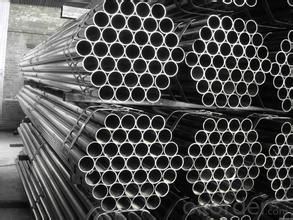
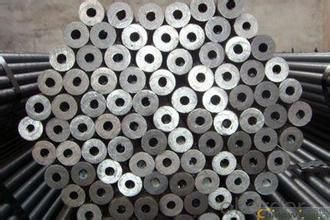
- Q: Can steel pipes be used for underground sewer systems?
- Yes, steel pipes can be used for underground sewer systems. Steel pipes are known for their durability, strength, and resistance to corrosion, making them a suitable choice for underground applications such as sewer systems. However, it is important to consider factors like soil conditions, potential for corrosion, and local regulations before selecting steel pipes for an underground sewer system.
- Q: What are the different types of supports used for aboveground steel pipes?
- There are several types of supports used for aboveground steel pipes, including pipe hangers, pipe shoes, pipe clamps, and pipe rollers. These supports are designed to provide stability, prevent sagging, and distribute the weight of the pipe evenly, ensuring the structural integrity of the system.
- Q: How are steel pipes used in the manufacturing industry?
- Steel pipes are commonly used in the manufacturing industry for various purposes such as transporting fluids and gases, providing structural support, and facilitating the flow of materials in industrial processes. They are essential for conveying liquids and gases over long distances or within manufacturing plants, ensuring efficient and reliable transportation. Additionally, steel pipes are utilized in the construction of infrastructure, machinery, and equipment, serving as a robust and durable component. Overall, steel pipes play a crucial role in the manufacturing industry due to their versatility, strength, and ability to withstand high pressure and temperature conditions.
- Q: Are steel pipes fire resistant?
- Indeed, steel pipes possess fire-resistant properties. Steel, being a non-combustible substance, does not ignite or aid in the propagation of flames. Moreover, steel pipes exhibit a remarkable resistance to high temperatures, allowing them to endure extreme conditions. Consequently, they are ideal for situations demanding fire resistance. Furthermore, steel is a resilient material that maintains its structural integrity and does not deteriorate when subjected to fire. Consequently, steel pipes are frequently selected for fire protection systems, including building sprinkler systems, as well as for industrial purposes when confronted with fire risks.
- Q: How are steel pipes used in the telecommunications infrastructure?
- Steel pipes are used in the telecommunications infrastructure for various purposes such as underground cable installation, mounting antennas, and supporting communication towers. They provide durability, strength, and protection for the cables and equipment, ensuring reliable and efficient communication networks.
- Q: What are the different factors affecting the flow rate of steel pipes?
- There are several factors that can affect the flow rate of steel pipes, including the diameter and length of the pipe, the viscosity and temperature of the fluid being transported, the pressure difference across the pipe, and any obstructions or irregularities in the pipe's interior surface. Additionally, the type of fluid being transported and its flow characteristics, such as laminar or turbulent flow, can also impact the flow rate of steel pipes.
- Q: Are steel pipes suitable for underground installations in areas with high moisture content?
- Yes, steel pipes are suitable for underground installations in areas with high moisture content. Steel pipes are known for their durability and resistance to corrosion, which makes them ideal for withstanding moisture and underground conditions. Additionally, steel pipes can be coated or lined with protective materials to further enhance their resistance to moisture, ensuring their long-term performance and reliability in such environments.
- Q: What are the different types of connections used with steel pipes?
- There are several types of connections commonly used with steel pipes, including threaded connections, welded connections, flanged connections, and grooved connections.
- Q: What's the use of steel pipe?
- (processing workshop of Tianjin steel pipe company as a result of the steel pipe truss structure, the actual steel saving up to 42.9%), with a steel pipe manufacturing highway bridge can not only save steel, simplify the construction, but also can greatly reduce the coated area, saving investment and maintenance costs.
- Q: Can steel pipes be used for paper mills?
- Yes, steel pipes can be used for paper mills. Steel pipes are widely used in various industries, including paper mills, due to their durability, strength, and resistance to corrosion. These pipes are commonly used for transporting water, chemicals, steam, and other fluids within the paper mill facilities.
Send your message to us
Welded Stainless Seamless Hot Rolled Steel Pipe
- Loading Port:
- China main port
- Payment Terms:
- TT or LC
- Min Order Qty:
- 100 kg
- Supply Capability:
- 10000 kg/month
OKorder Service Pledge
OKorder Financial Service
Similar products
Hot products
Hot Searches
Related keywords
